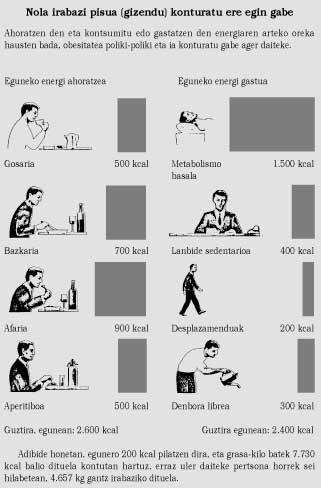Obesity
Obesity occurs in a situation equal to or greater than 20% of the normal statistical weight. And how to know what is the normal weight for a person? Observing tables that relate weight, height and corpus for a certain age (V. tables). However, too much fat accumulates in the body in obesity, as normally the fat containing cells (adipocytes) are added in size and/or quantity. (1. go)
Reasons

Obesity occurs when the body eats more calories than it can spend or burn. The most common causes are lack of nutrition and/or exercise rich in calories, but in other cases diseases can cause obesity: this is the case of hypothalamic tumors or inflammation, which affect the center of appetite (2. go) and force the patient to eat nonstop. Certain alterations in the internal secretion glands that transform metabolism also produce obesity.
Some tests suggest that thin people seem to use their food more effectively or efficiently while obese people accumulate them in the form of fat. However, if you eat more than you need, obesity always appears.
Symptoms
As fat accumulates, the volume increases throughout the body, the legs and arms have been bottled, the belly has increased and the hips have spread. The face is rolled, the skin acquires a characteristic appearance (shiny, stretched or brace) and under the chin accumulates fat (thick neck, ..).
Complications
Obesity is associated with increased mortality rate. Various diseases in obese people (e.g. arteriosclerosis, hypertension, diabetes, gout or gout, osteoarthritis or gallbladder diseases) are much more frequent, while varicose veins and hernias pose more problems to obese than people with normal weight.
Obese people usually have discomfort from digestion: fatigue or heaviness of the stomach, winds, constipation and liver cramps. In women, obesity can often cause menstrual alterations and even sterility.

Treatment
In the background it seems very “easy”: forcing the body to spend this excess fat (recommending a low-calorie diet and performing proper physical exercises).
However, food measures or slimming diets on the market suggest that there is no miracle. The safest method is to reduce the amount of food ingested through a balanced diet, always keeping the food necessary to maintain life.
Regardless of the diet used, during the first two weeks the weight is lost quickly, as water is easily lost. But then weight loss is much slower as it corresponds to the accumulated fat being consumed for energy.
Often the doctor prescribes medications for weight loss. Amphetamines were used a lot in the past (they lower appetite), but today they have retired in many countries because they produce addiction quickly. Unfortunately, there is not much medical data about the use of these pills and if people do not want to lose weight, and if they do not try, when they stop taking them, these people will gain weight again.
The ten commandments or nutritional prescriptions are:
|

- Should obese people be considered sick? Normally, a high percentage of obese people is not due to a disease, but to poor diet or sedentary life. However, obese people can also be considered sick, since obesity causes a number of complications throughout life (which seriously affect health). Therefore, it is clear that obese people are not because they are obese but because they are obese.
- Many people believe that “strong” people have more strength and energy than thin people... Not required. There are “strong” people who owe their constitution to a strong and strong musculature: they are active and strong. In other cases, however, the accumulation of fat in the composition is quite distinct. Excess fat is a useless weight to carry anywhere. And the effort to be made in this situation generates immediate fatigue. On the other hand, the muscles of obese people atrophy and therefore have little strength to work. When the fat disappears, the body is free from this overload and will quickly regain its previous strength.
- “My thighs or arms seem too thick for the weight I have” The body distribution of fat is different depending on sex. In men it occurs mainly the fattening of face, neck and belly, while in women the fat accumulates in the castes and thighs. Also, more fat builds up in the muscles of less contractile or less frequent areas. For this reason, in people who sit down for a long time, fat accumulates in cavities, thighs and buttocks in women and womb in men. Massages and special gymnastics can be used to remove this fat.
- Mrs. Nere has stones in her gallbladder, but the doctor tells her she won't be able to operate until she loses a few pounds. The risk of surgical interventions increases when the patient is obese. The heart of obese people is overloaded and their lungs do not get enough oxygen, which is a risk for anesthesia. On the other hand, excess fat makes it difficult to access organs inside the food. Complications of suture and postoperative (infections, hernias, etc.) are also more frequent.
- Is it not possible to lose kilos without sacrifices and lose weight? Fat is like a currency that the body stores for use when it needs when there is food shortage. As long as more calories are ingested than necessary, the body will become fat, and the only way to lose this fat is to consume it. And that how? Reducing calorie intake or spending calories through exercise. So far no substance has been found to force the body to expel that excessive fat. Therefore, all treatments against obesity are based on diet and exercise. In any diet of flaking it is necessary to eliminate foods rich in calories (sweet and fat) and considerably reduce bread and starches. But if the food measure has been correctly determined, they will not starve because despite being poor in calorie diets, you will have enough to satisfy your appetite. And the sacrifice that means giving up or doing some exercise to the foods that they like so much, will be immediately compensated for their agility and good condition (when they lose a few kilos).
- Do water and salt get fat? No. Water and salt do not fattening on their own, as they do not contain calories they do not produce fat. However, in obese people, and especially in women, there is a tendency to interrupt water and therefore to interrupt salts (because obesity increases the development of certain substances that hinder and hinder the elimination of water and salts). Therefore, in some diets salt is reduced and water consumption in meals is prevented.
- Why are those who stop playing sports fattened long before? Those who play sports, or have an important physical activity (in some hard trades), spend many calories, so, despite eating in abundance, they usually do not get fat. But when they go into a more sedentary life, although they maintain their previous appetite and eat as before, they spend less calories and gain more easily. The only solution in these cases is the change: reexercising or changing dietary habits.
- From obese parents, usually obese children. Is obesity hereditary? Although in some families almost all relatives are obese, in most cases the cause is not heredity, but inadequate food, since it is rich in starches and fats. In these cases bad dietary habits and not obesity are inherited.
- Is the fruit fattening? Many people believe that the fruit does not get fat, but it is not. Although fruits are rich in vitamins and mineral salts and should not falter in any diet to lose weight, do not forget that they contain sugar and therefore calories. And some fruits, bananas, grapes, etc., are totally prohibited because of their high sugar content in anti-obesity regimes.
- People are easily demoralized because these diets have to be maintained for a long time. The duration of treatment against obesity depends on the body's excess fat kilos. When surpluses are 5-10 kilos, it can last a couple of months, but if the excess weight is greater, the regimen should be extended in months. Therefore, to be successful you have to know very well where the border is and continue until the end.
- We have seen in the photos people weighing 250 kg. How is it possible? The body's ability to accumulate fat is enormous. That's why it's no wonder if a person eats a lot more calories than they spend, they gain a lot more weight. People weighing more than 300 kilos.
- Why do some people find it hard to lose weight more than others? The cells that store fat are adipocytes in the human body. They are normally found under the skin forming adipose tissue. When adipocytes are filled with fat, the person gets fat and when the adipocytes are emptied they lose weight. The number of adipocytes, the number of adipocytes a person has, is fixed in childhood. If the child eats a lot, his number of fat cells increases and although they do not multiply when he is an adult, they cannot be eliminated. And therefore, as there are many, the body will facilitate the storage of fat. This is why some people need longer, more demanding diets to lose weight than others.
Defects that the obese should never commit
- Desperation for his obesity, recognizing that being too fat is his destiny. Obesity can be repaired if you get a little interest (enough).
- Attend to the recommendations of “miracle diets” that friends or magazines, without any seriousness, lose weight in a few days. Many of these food measures are designed only for 15-20 days, and even if you lose a few kilos, nothing else leave the regime will gain those kilos (or perhaps more). These diets are also often poorly balanced and can be harmful.
- Overeating some foods (cookies, chocolate, bread or pasta) that are sold under the name of “dietetic” in several stores. These foods often have the same calories as normal. You have to check if they are really weak in calories.
- Skip some meal of the day. What is achieved is to have more appetite and will normally eat something before the next meal (“muquillo”). And, of course, by eating more at the next meal, the end result is usually eating more calories.
- Flee the diet and think that the problem can be solved only with gymnastics. Exercise helps you lose weight, but whenever you reduce food at once.
- Think that obesity is solved with massages and slimming creams. These methods only serve to thin parts of the body where there is not too much accumulated fat.
- Try to solve obesity with laxatives, diuretics or unappetizing pills. These medicines are dangerous to health and are not effective if they are not done in combination with a proper diet or regimen.

Note: To see the images well go to the PDF format.
Buletina
Bidali zure helbide elektronikoa eta jaso asteroko buletina zure sarrera-ontzian








